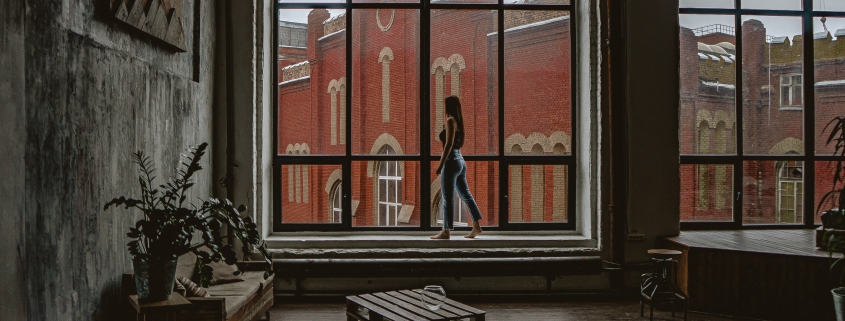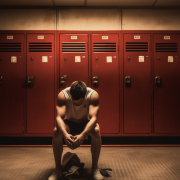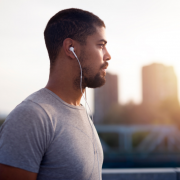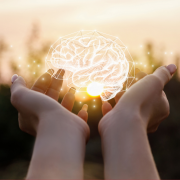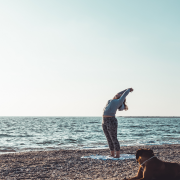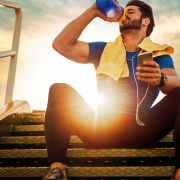An Athlete’s Guide to Looking After Yourself During Isolation
Across the globe, people are limited, like never before, with what they can and can’t do. This has, naturally, had a massive impact on everyone’s life and health, meaning that it is more essential than ever to make sure that we tick all the boxes in terms of our health.
Exercise
During this time, it is incredibly important to keep exercising. Since (almost) all sporting competitions and events across the globe have been cancelled, it can become very demotivating to work without a goal. On top of this, with gyms closed and social distancing measures meaning that we cannot train with a partner, more barriers are in the way of our goals. The ability to overcome obstacles is what separates us as athletes.
“Obstacles don’t have to stop you. If you run into a wall, don’t turn around and give up. Figure out how to climb it, go through it, or work around it.”
Michael Jordan
At the very minimum, we want to maintain our fitness, however by using this unprecedented time to do more than anyone else, it distinguishes you and you will be ahead of the rest when we are released back into the sporting world again. One crucial thing to note is that it is important to do something even if it is significantly less than before. One study into resistance training showed that even when doing 1/9th of the original training, participants were able to maintain their muscle mass for the duration of a 32 week period, whereas those who did not undergo any training over 32 weeks regressed to their original muscle mass before the training plan began (1). However, now is not the time for complacency or downheartedness – we have a unique opportunity to use this time to progress and focus on our health in a way that we have never before.
It is also important to consider the positive effect that exercise has on our mental health. Exercise has been shown to reduce depression and anxiety and has positive effects on mood, self-esteem and cognitive function (2). This is another of the many reasons why we should continue to exercise regularly.
Sleep
With significantly reduced social commitments it is very easy to let our sleep habits go to pot. Aside from having a negative effect on our physical and mental recovery, poor sleep quality impairs our immune system (3), something we naturally don’t want during a global pandemic. When sleeping, there are a few crucial things to take into account: consistency, appropriate length and quality – all which influence each other. By setting a consistent bedtime and wake up time you can reduce the time it takes to fall asleep as well as improving the quality of your sleep by allowing you to spend appropriate time in each sleep stage. When considering sleep length it is important to remember not only to get enough sleep but also not to get too much, having too little or too much sleep is associated with worse health (4). We cannot ‘store’ sleep and so once we have achieved all the sleep we need, sleep is essentially a waste of time and time that we can utilise for better purposes. When considering appropriate sleep length it can also be helpful to think in terms of 90-minute cycles, rather than hours – a more accurate representation of our sleep. You can use an app such as SleepCycle to track your sleep and wake you up at the lightest point so you feel free and ready to start the day. It is crucial to practice good sleep habits, try to turn off blue light sources as you prepare to sleep so as not to interfere with melatonin secretion, which is inhibited by the presence of blue light. To read more on sleeping efficiently, click here.
Nutrition
Strictly speaking, the immune system cannot be boosted through vitamins. However, vitamins can be used to support normal immune function. Whilst it might not be necessary to supplement vitamins or minerals, it is important to get a sufficient amount in your diet, and if you are unable to achieve suitable levels with your diet, then consider changing your diet or supplementing. Essential vitamins and minerals for supporting immune function are copper, folate, iron, selenium, zinc and vitamins A, B6, B12, C and D (5). You might find it useful to use an app, such as Cronometer, to track your micronutrient intake and highlight deficiencies. One vitamin to highlight in particular is vitamin D, which we get from sunlight. Considering the lockdown measures that many countries have put in this creates a challenge, particularly knowing that in normal circumstances 40% of Americans are deficient in vitamin D (6). If you have a garden, try to use it throughout the day or if your current government regulations allow, try to get outside, whilst abiding by social distancing measures. If you are unable to get outside, then consider supplementing vitamin D. Overall maintaining a healthy diet, rich in the relevant nutrients can help to maintain immune function during this crucial time.
Mindfulness
During this strange period, it is easy for us to become stressed and distressed by the circumstances. To help combat this, set aside some time daily to
We have put together a demo of these to help with your mindfulness during this difficult time, which you can access using the following video.
To read more about the positive effects of mindfulness, click here.
Overall, it is incredibly important to stay healthy and active during these uncertain times. Try to create structure in your life where structure lacks and use this unique time effectively to improve yourself without social pressure.
Join Our Community!
References
1. Bickel CS, Cross JM, Bamman MM. Exercise dosing to retain resistance training adaptations in young and older adults. Medicine and Science in Sports and Exercise. 2011.
2. Callaghan P. Exercise: A neglected intervention in mental health care? Journal of Psychiatric and Mental Health Nursing. 2004.
3. Besedovsky L, Lange T, Haack M. The sleep-immune crosstalk in health and disease. Physiol Rev. 2019;
4. Kim CE, Shin S, Lee HW, Lim J, Lee JK, Shin A, et al. Association between sleep duration and metabolic syndrome: A cross-sectional study. BMC Public Health. 2018;
5. British Dietetic Association. COVID-19 / Coronavirus – Advice for the General Public. 2020.
6. Forrest KYZ, Stuhldreher WL. Prevalence and correlates of vitamin D deficiency in US adults. Nutr Res. 2011;
7. Astin JA. Stress reduction through mindfulness meditation. Psychother Psychosom. 1997;
8. Stinson A. What is box breathing? Medical News Today. 2018.
9. Axelsen JL, Kirk U, Staiano W. On-the-Spot Binaural Beats and Mindfulness Reduces the Effect of Mental Fatigue. J Cogn Enhanc. 2020;

